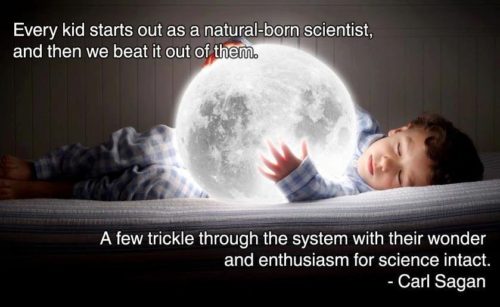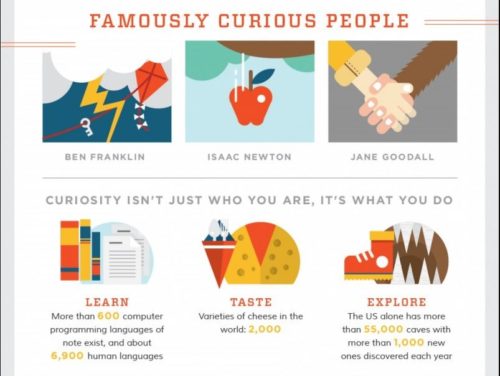
We’re all born curious but over time we lose that desire to question things and explore. But we stand to gain a lot by reconnecting with that child-like sensibility. Studies have shown that curious people are the happiest and tend to experience more success than someone who isn’t. Find out the many ways that curiosity can serve you. (Estimated reading time: 7 minutes)
“We keep moving forward, opening new doors, and doing new things, because we’re curious and curiosity keeps leading us down new paths.”
— Walt Disney
Does curiosity really kill the cat?
Maybe. But it certainly keeps us humans alive and well.
Curiosity is a fundamental characteristic of human nature. It’s what made our species, Homo sapiens, survive and overcome environmental threats such as extreme climatic conditions, dangerous predatory animals, and other Homo species competing for resources.
Not many people know this, but when humans first appeared on Earth some 250,000-400,000 years ago, there were different human species that existed on Earth, such as Homo Neanderthals, Home Erectus, Homo Habilis and several others. However, only the Homo sapiens survived, while the others perished.
Anthropologists believe that Homo sapiens were able to stand the test of time because of their survival instincts and unique characteristics. One being their ability to adapt to any sort of environment they find themselves in. Second, their propensity to question things and follow their natural sense of curiosity.
As we’ve evolved over the centuries, we’ve continued to thrive from our adaptability and curiosity. All major discoveries and artistic endeavors took root from the seeds of curiosity.
Our civilization progressed because of the likes of Einstein, Galileo, Columbus, Marie Curie, Thomas Edison, Isaac Newton and countless others. They weren’t afraid to ask the questions: “Why?”, “How?” or “What?”

All of us are born curious because curiosity is encoded in our DNA. As children, we were exceptionally curious and had a deep sense of wonder.
We weren’t afraid to explore and ask questions along the way. Life was like one grand adventure and we were the protagonists, out to discover new territory every day.
But as we grow up, we gradually lose that innate sense of awe and curiosity. We’re conditioned to fit into a workplace and society that values answers more than questions, so we forget the art of asking. Our instinct to explore is dampened by our desire to conform. This turns many people into cynical know-it-all’s with mindsets that block them from broadening their horizons.
The greatest barrier to embracing our natural curiosity is fear. In the face of risk and uncertainty, we feel more comfortable with staying confined to what feels safe. We’ll stay in our dead-end job instead of looking into the possibility of a new dream career path; we refrain from traveling, trying ethnic dishes or we avoid taking a different route to work, all because we’re afraid to let curiosity take the full reins.
But reconnecting with our curiosity is critical to our success and happiness. Our society has moved out of the industrial era and into the information area, where curiosity is now a major currency that can open doors and possibilities for us. The global wealth is no longer limited to the pockets of aristocrats and the bourgeoisie’s but to entrepreneurs and tech-geniuses who followed their sparks of curiosity.

Staying curious can also kick our “happiness set point” up a few notches. In his book, Curious: Discovering the Missing Ingredient, author Todd Kashdan says, “Curious explorers are comfortable with the risks of taking on new challenges. Instead of trying desperately to explain and control our world, a curious explorer embraces uncertainty and sees life as an enjoyable quest to discover, learn and grow.”
Following our curiosity is an exciting prospect because we can never know where it will take us on our journey. It’s like following a treasure trail that could lead us to something wonderful. If we’re tuned in, it can take us on a journey towards a greater understanding of who we are and our purpose.
In her book, Big Magic, Elizabeth Gilbert writes:
“Be curious. It might lead to your passion or it might not. You might get nothing out of it but a beautiful, long life where all you did was follow your gorgeous curiosity and that should be enough. Passion can be intimidatingly out of reach at times, like a distant tower of flame, accessible only to geniuses. But curiosity is available to everyone!”
So don’t be afraid to put on your explorer hat and seek the mysterious and unfamiliar facets of your existence. Following your curiosity doesn’t take a massive effort but just the initiative to follow those tiny impulses of curiosity. Read that book, take that course, ask questions, have an open mind, and stay humble in your pursuit for knowledge. And, most importantly, see learning as a fun activity.

There’s plenty of evidence to support the claim that curious people are the happiest on the planet. Not only do these wide-eyed folks end up having a lot more fun than others, but they also experience a number of other surprising benefits:
1. They are more likely to stumble upon the right opportunities: Curious people have the drive and impetus to dig deep into a subject they love until they strike gold. They have the tenacity and patience to hang on long enough until the right opportunities come along the way. Their curiosity gives them the insight to see new worlds and possibilities that aren’t normally visible to others. They’re willing to look beneath the surface of things and venture into the unknown. Unlike most people, they are comfortable with uncertainty and instead of fearing the unknown, they are stimulated by it. They tend to stumble upon good fortune because they can step into this cryptic abyss where all the treasures lay hidden.
2. They have a growth mindset, which leads to progress: Curious people are focused on the possibilities for growth versus the constraints in a situation. A classic example of someone who had this mindset is Walt Disney. Whenever someone told him that something could not be done or was a bad idea, whether it was doing the first feature-length cartoon (Snow White in 1939) or building large-scale theme park for families (Disneyland), he always found a way to get it done and prove that person wrong. He was a bold risk-taker, with an active mind, who was always searching for answers and solutions in his mind. Curious people like him are too focused on progress to worry about the limitations and negativity of naysayers.
3. They’re hardly ever bored: A curious person’s mind is like a colorful mosaic with many beautiful hues. If you’ve ever been around a curious person, you’ll notice that they have an almost child-like disposition, always on the lookout for the latest news and happenings. To them, life is like a thrilling ride that’s filled with a myriad of things that attract their attention, people to meet, things to learn, and new “toys” to play with. With their active imaginations, there’s hardly ever a dull moment in their life – one of the big reasons why curious people are the happiest.
4. They’re often the life of the party: With all the knowledge and enthusiasm that they have for life, curious people often make interesting and engaging conversationalists. They always have lots of unusual tidbits of information, anecdotes and stories to share with others. They’re also great listeners because of their genuine curiosity about other people. Their sincere interest in people is flattering to those who speak with them. It makes them come across as being more likable because almost everyone enjoys spending time with individuals who demonstrate an interest in what they have to say, while also maintaining their own interests.
5. They understand life on a deeper level: It takes a reflective and inquiring mind to access the deeper dimensions of life. All religious, philosophical and literary luminaries were able to reach a state of enlightenment and breakthroughs because they asked penetrating questions that revealed to them the hidden truths of life. They weren’t curious about superficial matters such as gossip or the “latest scoop”, but about worldly, intellectual and spiritual matters that added wisdom and meaning to their existence. Living in this state of inquiry creates an internal experience that’s steeped in magic and majesty.
Albert Einstein said, “The important thing is not to stop questioning. Curiosity has its own reason for existing. It is enough if one tries merely to comprehend a little of this mystery every day. Never lose a holy curiosity.”
Given that curious people are the happiest, make curiosity a conscious practice in your daily life and allow it to take you into new vistas, where wondrous things, places and people are waiting to be discovered by you.
All my best on your journey,
Seline

Question for you: Do you agree that curious people the happiest? Can you identify with these happy folks?
Did you like this post? Sign up below and I’ll send you more awesome posts like this every week.

They say beauty is in the eye of the beholder and I think the same goes for creativity- some people see it as creativity others see it as goofing off and others see it as making a mess.
I’ve struggled with getting people to see and understand my creativity for years! But I still woulndt’ change a thing.
I feel you, my sister! It always seems to be that those of us who are overly creative and artistically minded are not understood until long after we are gone. Look at the great artist and authors- their work was never appreciated until long after their deaths. Kinda depressing…. but at least we get joy out creating and can take some comfort in the fact that someday someone will love our work as much as we did!